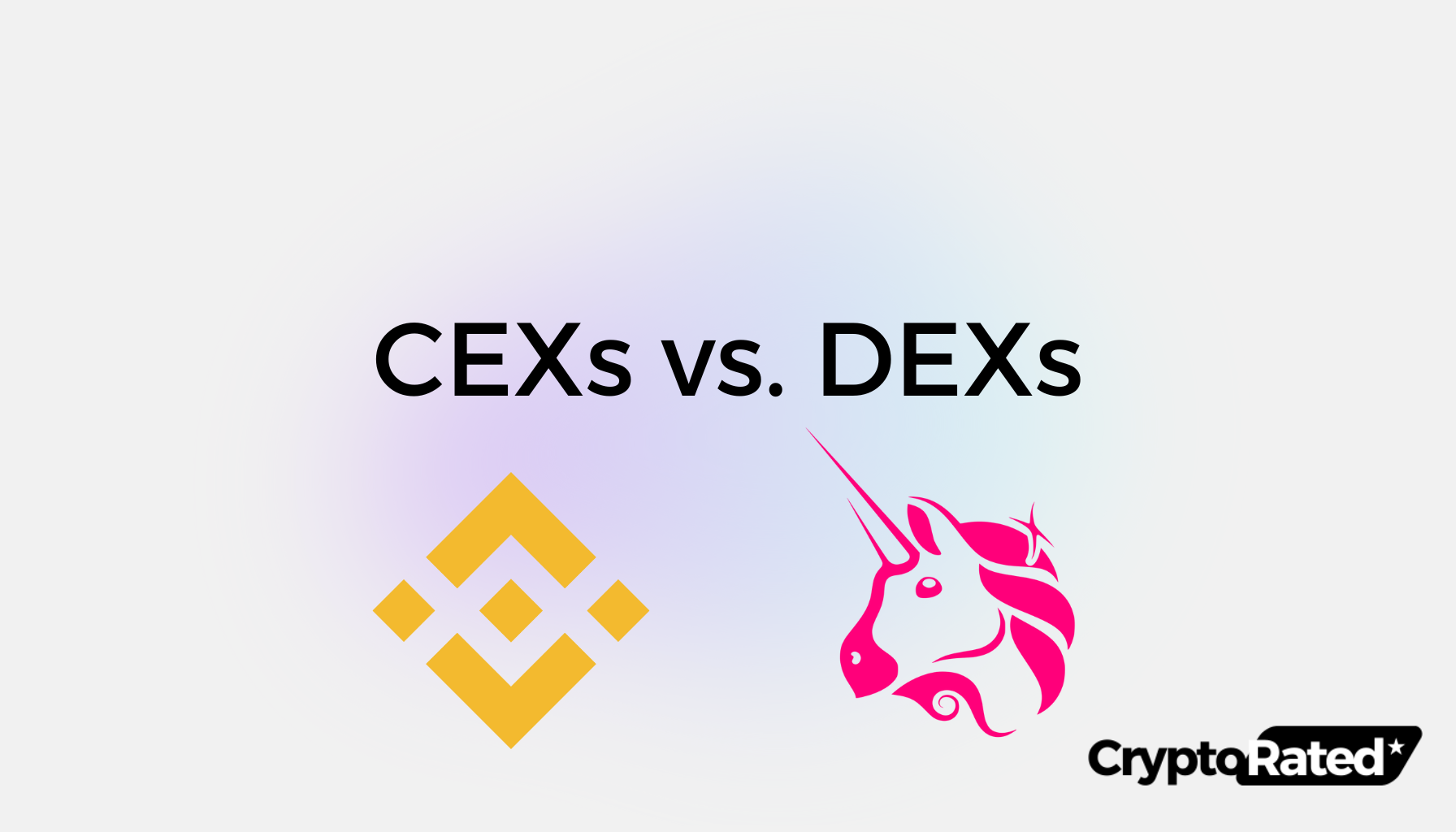
Centralized vs. Decentralized Crypto Exchanges: How Do They Work?
A centralized crypto exchange is a platform controlled by a central entity that acts as an intermediary between buyers and sellers. This type of exchange is the most popular way for typical users, especially new investors, to purchase cryptocurrencies. Assets are stored on behalf of clients while the exchange facilitates trading mechanics and sets terms and conditions.
Decentralized exchanges operate without a central authority, letting users trade directly through smart contracts on blockchains like Ethereum and Solana. This removes middlemen, improving security and reducing hacking risk. Users have increased control of their funds and can participate in peer-to-peer trading with more privacy and transparency.
Key Takeaways
- Centralized exchanges (CEXs) are like traditional stock exchanges, with a single company controlling the platform and holding your assets.
- Decentralized exchanges (DEXs) are peer-to-peer marketplaces where users trade directly with each other without a central authority.
- CEXs offer faster trades, higher liquidity, and more fiat currency options, but they require you to give up control of your assets and may be subject to regulation.
What Is a Centralized Crypto Exchange?
A centralized crypto exchange (CEX) is an online platform where users buy, sell, and trade cryptocurrencies. Imagine it as a digital stock but for crypto assets. Unlike its decentralized counterpart, a CEX operates under a single entity that manages orders, matches buyers and sellers, and holds users’ funds (acting as a custodian). This makes CEXs faster and easier to use for beginners but also introduces a single point of failure and raises concerns about trust and control.
Think of it as a convenient one-stop shop for crypto trading but with trade-offs in terms of decentralization and individual autonomy. Users flock to leading exchanges such as Binance, OKX or Bybit to trade leading cryptos such as Bitcoin, Ethereum, and Solana.
Advantages of Centralized Crypto Exchanges
Centralized exchanges have several advantages over decentralized ones.
User-Friendly Interface
Centralized exchanges are designed with simplicity in mind, making them easy to use for both novice and advanced users. They allow users to navigate, deposit, and withdraw their funds effortlessly.
Wide Range of Trading Options
Established centralized exchanges usually support a wider range of cryptocurrencies for trading than decentralized ones. This extensive array of options is a boon for users who seek to diversify their investment portfolios.
Higher Liquidity
Centralized exchanges have higher liquidity compared to decentralized. Liquidity refers to the ease with which a user can purchase or sell an asset without significantly impacting its prevailing market value. Centralized exchanges have access to a more extensive pool of buyers and sellers, which contributes to higher liquidity. Additionally, access to regulated market makers also contributes to higher liquidity.
Regulatory Conformity
Many centralized crypto exchanges are owned by regulated entities and are, therefore, subject to rigorous regulatory oversight. This is a vital element that appeals to institutional investors that require a degree of regulatory conformity to deal with cryptocurrencies. This factor also appeals to professional traders and investors.

What Are The Disadvantages of Centralized Crypto Exchanges?
Centralized exchanges are not without significant drawbacks.
Lack of Control Over Wallet Keys
One major disadvantage of using centralized exchanges is that users have no control over their crypto wallet keys. This means that they lack direct access to their assets, and this can lead to significant losses, for example, in the event an unregulated exchange abruptly shuts down.
Security Issues
Over the years, centralized exchanges have been the targets of high-profile hacks that have resulted in the loss of hundreds of millions of dollars worth of cryptocurrencies. Many of the hack schemes have targeted central authorities that are deemed to be a likely point of failure. Their centralized control also makes them susceptible to rug pulls, causing investors to lose money.
Regulatory Restrictions
Many centralized exchanges are controlled by regulated entities that are, in turn, subject to the oversight of regulatory authorities. The regulatory authorities usually have the power to impose stringent restrictions, such as new licensing requirements and compliance regulations on the platforms, and this can sometimes limit their ability to support some tokens or serve users in certain jurisdictions.
Conflicts of Interest
Since they are designed for maximum profitability, some centralized exchanges may resort to unethical practices, such as market data manipulation, to increase their profits at the expense of their users. This can result in a negative user experience.
What is a Decentralized Crypto Exchange?
A decentralized exchange (DEX) is an exchange built atop a decentralized, noncustodial blockchain system that primarily supports direct peer-to-peer transactions. Unlike centralized exchanges, DEXs do not require intermediaries, and the processes are controlled by self-executing blockchain-based applications known as smart contracts. These types of exchanges are designed to support peer-to-peer trading between cryptocurrency users.
What are the key features and advantages of using a DEX?
One of the key features of a decentralized crypto exchange is that it eliminates the need for intermediaries, which means that users can trade directly with each other. Furthermore, DEXs do not require users to complete a KYC process, which enables them to trade anonymously. Decentralized exchanges enable users to maintain autonomy over their private keys, and therefore, they are solely responsible for the security of their funds. Some examples of decentralized exchanges include PancakeSwap, Uniswap, dYdX, and Bisq.
1. Increased Security and Control:
- No custodianship: With a DEX, you retain custody of your private keys and crypto assets at all times, unlike CEXs, where they are held by the exchange. This reduces the risk of centralized hacks or platform-level malfunctions causing potential loss of funds.
- Transparency and immutability: All transactions on a DEX are recorded on a publicly accessible blockchain, ensuring transparency and immutability. This allows users to verify the integrity of the platform and track their own trading activity.
- Reduced censorship risk: DEXs are less susceptible to censorship or asset freezes compared to CEXs, which may be subject to regulatory constraints or government intervention.
2. Improved Privacy:
- No KYC/AML requirements: Many DEXs don’t require Know Your Customer (KYC) or Anti-Money Laundering (AML) verification, offering increased privacy for users who value anonymity.
- Self-sovereign identity: You maintain control over your identity and information on a DEX, unlike CEXs, where some personal details can be required for account creation and trading.
3. Access to Niche and Innovative Assets:
- Different variety of tokens: DEXs often list newer and potentially high-growth projects that may not yet be available on established CEXs. This allows users to explore emerging opportunities in the DeFi space, but it often means exposure to very risky low-cap projects too.
- Direct participation in DeFi protocols: DEXs enable direct interaction with decentralized finance (DeFi) protocols like liquidity pools and yield farming, offering users alternative avenues for earning returns on their crypto holdings.
What Are The Disadvantages of a DEX?
While DEXs offer unique advantages, their decentralized nature presents certain challenges for users. Here are three key disadvantages to consider:
1. Lower Liquidity and User-friendliness:
- Limited trading pairs: Compared to CEXs, DEXs generally have fewer trading pairs available, meaning fewer options for buying and selling specific cryptocurrencies. This can lead to difficulties finding counterparties for your trades, especially for less popular assets.
- Higher slippage: Due to lower liquidity, trades on DEXs can experience larger slippage, meaning the final execution price may differ significantly from your desired price. This can be particularly impactful for larger trades.
- Technical complexity: Using a DEX often requires a higher level of technical understanding compared to CEXs. Users need to manage their own wallets, understand blockchain basics, and interact directly with smart contracts, which can be daunting for beginners.
2. Potential Security Concerns:
- Smart contract vulnerabilities: DEXs rely on smart contracts for their operation, which can be vulnerable to exploits if not properly audited and secured. This can lead to potential loss of funds if malicious actors manage to manipulate the protocol.
- User error: Unlike CEXs, DEXs offer no custodial protection. Users are solely responsible for securing their private keys and assets. Any mistakes or security breaches on their end can result in permanent loss of funds.
- Rug pulls and scams: DEXs may list unverified or new tokens with high risk of being scams or “rug pulls” where developers abandon the project after raising funds. Users need to exercise caution and conduct thorough research before investing in any token on a DEX.
3. Limited Functionality and Scalability:
- Fewer advanced features: Compared to CEXs, DEXs typically offer fewer advanced features like margin trading, stop-loss orders, and sophisticated charting tools. This can limit trading strategies and hinder professional traders.
- Scalability issues: As DEX user base and transaction volume grow, the underlying blockchain network can become congested, leading to slower transaction times and higher gas fees. This can limit the scalability and practicality of DEXs for high-frequency trading or large transactions.
What Are The Leading Decentralized Exchanges (DEXs)?
The landscape of DEXs is constantly evolving, but here are some of the current top contenders, with a brief overview of each:
- Uniswap (UNI): The OG of DEXs, Uniswap pioneered the automated market maker (AMM) model and dominates the Ethereum DeFi space. With a vast liquidity pool and diverse token offerings, it’s a versatile platform for experienced traders and newcomers alike.
- PancakeSwap (CAKE): Built on the Binance Smart Chain, PancakeSwap offers faster transaction speeds and lower fees compared to Ethereum-based DEXs. Its gamified features and attractive yield farming options attract a large user base seeking high returns.
- SushiSwap (SUSHI): A fork of Uniswap with additional features like margin trading and lending, SushiSwap caters to more advanced DeFi users. Its own SUSHI token rewards liquidity providers and offers voting rights on platform governance.

What Are The Core Differences Between Centralized Decentralized Exchanges?
| Feature | Centralized Exchanges (CEX) | Decentralized Exchanges (DEX) |
|---|---|---|
| Control | Controlled by a company or organization | Operated by a network of users |
| Custody | Require users to deposit funds into an exchange-controlled wallet | Allow users to retain control of their funds in their own wallets |
| Liquidity | Often have more liquidity and trading pairs | May have less liquidity and fewer trading pairs |
| KYC/AML | Require users to provide personal information for KYC/AML compliance | Allow users to trade anonymously without KYC/AML |
| Security | May be vulnerable to hacks and thefts | Are more secure due to the use of smart contracts and encryption |
| Fees | May require fees for trading and withdrawals | Tend to have lower fees for trading and withdrawals |
Final Thoughts on Centralized and Decentralized Exchanges
Centralized exchanges like Binance, Bybit and OKX have allowed crypto to edge closer to mainstream adoption; they’ve provided fairly simple systems for buying crypto using fiat currencies. They also attempt to bridge regulatory hurdles. However, CEX infringes upon some of the basic principles of Bitcoin philosophy, such as privacy and decentralization, and this is where DEXs shine. They allow users to trade crypto anonymously without relying on a central third party, which is arguably the purest way to participate in the blockchain ecosystem. The reality is that both types of exchanges have a place in today’s market, which is reflected in the billions of dollars that are traded on the leading CEXs and DEXs every day.
Frequently Asked Questions
What are the Key Differences between Centralized and Decentralized Cryptocurrency Exchanges?
Centralized exchanges are run by a single entity and act as a middleman between buyers and sellers. They require users to trust the exchange with their funds and personal information. Decentralized exchanges, on the other hand, are built on blockchain technology and allow users to trade cryptocurrencies without a middleman. They offer users more control over their funds and personal information.
What are the Differences in Security between Centralized vs Decentralized Crypto Exchanges?
Centralized exchanges are often targeted by hackers due to their centralized nature. Decentralized exchanges are less prone to hacking as they are built on blockchain technology, which provides a high level of security. However, they are not completely immune to attacks, as hackers can still target individual smart contracts.
What are the Advantages of Using a Decentralized Exchange over a Centralized One?
Decentralized exchanges offer users more control over their funds and personal information. They are also less prone to hacking as they are built on blockchain technology. Additionally, decentralized exchanges are often more transparent as all transactions are recorded on the blockchain.
WRITTEN
Peter Barker
Peter is an experienced crypto content writer and a DeFi enthusiast with more than 3+ years of experience in the space. Previously a journalist and news editor at a leading European news sourcing agency.




